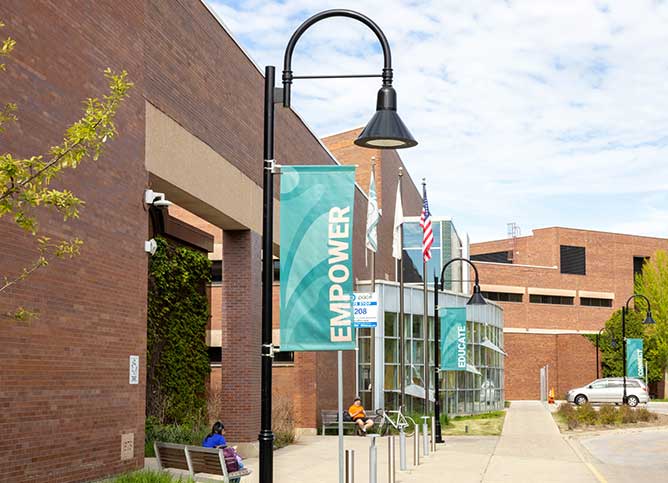A Phlebotomist is an important member of a healthcare team. In addition to sanitizing equipment, verifying patients' identities, performing blood draws, and organizing supplies, they must connect with people, ease anxieties, and explain procedures to patients.
At Oakton, you can study and prepare to become a certified phlebotomist in as little as one semester. You will be eligible for positions in settings such as:
Graduates of the phlebotomy certificate program are eligible to apply for the American Society for Clinical Pathology (ASCP) Phlebotomy Certification Exam. This certificate is a valuable credential for healthcare professionals, including nurses, medical assistants and physician assistants.
The goal of the Phlebotomy Certificate program is to train individuals to perform phlebotomy procedures, the collection of blood for diagnostic testing. The curriculum at Oakton is in compliance with standardized educational curricula and accepted routes for national certification, in preparation for qualification by national and state agencies. This certificate is of value to health care professionals, including nurses.
Enrolling at Oakton College can save you thousands of dollars and help you earn more over the course of your career. Our tuition is among the lowest in the region, and we offer many ways to bring your costs down even more.
99 percent of Oakton students graduate without debt.
To help you get there, you can apply for a scholarship, which you don’t have to pay back. We award $12 million in scholarships annually. Financial Aid includes grants, loans, and other forms of financial assistance that can reduce your costs of attending college.
We offer payment options that give you control over how you pay. Pay all at once or spread your payments over the course of the semester.
Learn more about your options for paying for your education

Oakton's Academic Catalog is your guide to programs, course descriptions and policies. You will find an overview of what classes are required for your certificate/degree, your pathway (or suggested sequence of classwork), along with learning outcomes.
Connecting with an advisor before you start the enrollment process can help you on your best path forward.
View the Course Catalog for the Phlebotomy Certificate
Our phlebotomy certificate program is a limited enrollment program with specific admission requirements.
Those admitted will be required to submit a current and complete physical examination record, clear criminal background check and drug screen before registering in MLT 204.
Current and returning Oakton students should apply through the applicant dashboard (found in the New Student Information section) on the home page of their myOakton account.
Clinical placements require a health assessment, certain immunizations, yearly flu vaccine, substance abuse testing, criminal background check, specific skill certification (i.e., CPR) and health insurance. These requirements represent an additional cost to the student.
All Oakton College Health Career students in nursing, physical therapist assistant, medical laboratory technology, pharmacy technician, phlebotomy, health information technology, cancer registry management, and medical assistant programs must have "clear" criminal background checks and drug screens in order to participate in any and all clinical components of any health career program courses. See the career programs pages for further details.
To comply with state statutes and clinical affiliation agreements, and to provide a safe environment for students, employees, and patients cared for by students, those accepted into Oakton's health career programs will be required to complete a criminal background check and drug screening through a company contracted by the College. Health Career students will be charged a fee for this service.
Timelines for completing criminal background checks and drug screens may vary among the various programs. Deadline dates for each program will be provided by the individual department chairs at the time of a student's acceptance into a health career program.
Students without a clear criminal background check and/or clear drug screen will not be allowed to enroll in clinical practicum courses or attend clinical programs. This would further necessitate that the student withdraw from the health career program at that time.
Students who refuse a criminal background check and/or drug screen will not be considered "clear" and will not be authorized to participate in the clinical component of the health career program, necessitating withdrawal from the program at that time.
Individual results of student background checks and drug screens are considered confidential.
Determination of whether or not a student can participate in the clinical component of a particular health career program will be communicated to the respective department chairs by the Background Check/Drug Screen vendor. Students may view their personal results on the vendor's website.Clinical placements require a health assessment, certain immunizations, yearly flu vaccine, substance abuse testing, criminal background check, specific skill certification (i.e., CPR) and health insurance. These requirements represent an additional cost to the student.
All Oakton College Health Career students in nursing, physical therapist assistant, medical laboratory technology, pharmacy technician, phlebotomy, health information technology, cancer registry management, and medical assistant programs must have "clear" criminal background checks and drug screens in order to participate in any and all clinical components of any health career program courses. See the career programs pages for further details.
To comply with state statutes and clinical affiliation agreements, and to provide a safe environment for students, employees, and patients cared for by students, those accepted into Oakton's health career programs will be required to complete a criminal background check and drug screening through a company contracted by the College. Health Career students will be charged a fee for this service.
Timelines for completing criminal background checks and drug screens may vary among the various programs. Deadline dates for each program will be provided by the individual department chairs at the time of a student's acceptance into a health career program.
Students without a clear criminal background check and/or clear drug screen will not be allowed to enroll in clinical practicum courses or attend clinical programs. This would further necessitate that the student withdraw from the health career program at that time.
Students who refuse a criminal background check and/or drug screen will not be considered "clear" and will not be authorized to participate in the clinical component of the health career program, necessitating withdrawal from the program at that time.
Individual results of student background checks and drug screens are considered confidential.
Determination of whether or not a student can participate in the clinical component of a particular health career program will be communicated to the respective department chairs by the Background Check/Drug Screen vendor. Students may view their personal results on the vendor's website.
With the availability of the COVID-19 vaccine, our clinical site partners are updating their requirements for COVID-19 vaccination. Oakton must also follow the requirements of our clinical sites with regard to immunization requirements. It is the decision of the clinical sites, not Oakton, if immunizations are required for our students. Effective for the Spring 2022 semester, the clinical facility partners will not permit students to participate in clinical experiences at any of their facilities without the COVID-19 vaccination.
Students are not employees and have neither employee benefits nor access through employee health services at the facility, therefore, accommodations for declination of vaccination will not be honored. As guests of each facility, Oakton programs must abide by the rules of the facility.
Students must provide proof of vaccination. Failure to provide documentation will result in student dismissal from clinical courses.
As a phlebotomy student, you will need to perform each of the following essential skills.
Each state and territory has different licensure and certification requirements. Oakton has researched and/or contacted state licensing authorities to confirm that the program meets the educational requirements leading to professional licensure. Other licensure requirements may include professional certification exams, background checks, years of work experience, fingerprinting, etc.
Licensure information is reviewed and updated on this site in June of each year. Licensure information is reviewed and updated on this site in June of each year. As of July 1, 2020, we have determined that individuals that successfully complete Phlebotomy Certificate Program curriculum:
Meets the education requirements leading to licensure/certification in these states and U.S. Territories: Illinois
Does NOT meet the education requirements For licensure/certification in these states and U.S. Territories:
We have not made a determination if the program curriculum meets the requirements for licensure/certification in these states and US Territories: Alabama, Alaska, American Samoa, Arizona, Arkansas, California, Colorado, Connecticut, Delaware, District of Columbia, Florida, Georgia, Guam, Hawaii, Idaho, Indiana, Iowa, Kansas, Kentucky, Louisiana, Maine, Maryland, Massachusetts, Michigan, Minnesota, Mississippi, Missouri, Montana, Nebraska, Nevada,New Hampshire, New Jersey,New Mexico, New York, North Carolina, North Dakota, Northern Mariana Islands, Ohio, Oklahoma, Oregon, Pennsylvania, Puerto Rico, Rhode Island, South Carolina, South Dakota, Tennessee, Texas, U.S. Virgin Islands, Utah, Vermont, Virginia, Washington, West Virginia, Wisconsin, Wyoming
If you intend to practice in any state other than Illinois, you should contact the appropriate licensing agency to independently verify whether Oakton’s program satisfies the educational requirements for licensure in a particular state before beginning Oakton’s program. Be aware that state licensure requirements may change from time-to-time and that states may have conditions for licensure in addition to educational requirements.
This information is provided to meet the Disclosure Requirements for Academic Programs Leading to Professional Licensure or Certification.
Oakton's professors and lecturers are experts in their fields with advanced degrees and years of real-world experience.
In addition to classroom learning, students receive support from our panel of expert advisors.
Sandy Abermann
Laboratory Director
NorthShore University HealthSystem
Highland Park Hospital
Isabella Burnett
Phlebotomy Manager, Lab Services
Northshore University HealthSystems
Merle Essex
Illinois Education Coordinator
ACL Laboratories
Tyrie Gardner
MLS Program Director
Northshore University Health System
Ruth Kreyer
Education Coordinator
Microbiology Manager/Instructor
Mercy Hospital
Margaret Langguth
Director, Lab Services
Northshore University HealthSystems
Claudia Miller
Professor, Health Studies
National Louis University
Illinois North Shore Campus
Ignacio Bustamante Murcia
Laboratory Manager
St. Francis Hospital
Ramoncito A. Reyes
Director of Manufacturing
LifeSource Blood Services
Melissa Rho
Blood Bank Supervisor
North Shore University Health Systems
Sue Saccommano
Phlebotomy Supervisor
Resurrection Medical Center
Maria Saez-Buenaobra
Laboratory Manager
NICL
Larry Steinberg
Blood Bank Laboratory Clinical Instructor
Swedish Covenant Hospital
Deepika Zafar
Education Coordinator/Clinical Instructor
Ruth Williams
Assistant Vice President for Academic Affairs
Dean of Curriculum and Instruction